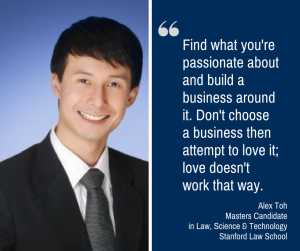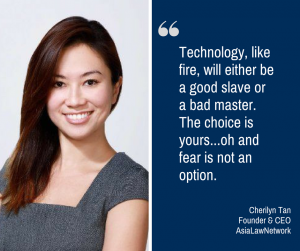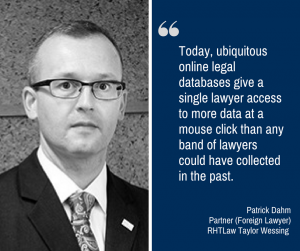Written by Amelia Chew | Edited by Stella Chen
How is technology transforming the legal industry and the practice of law today?
What does this mean for a young lawyer starting out in practice?
More fundamentally, why does it matter?
These are the questions that confronted the panellists at How Technology Is Changing Your Future Careers, co-organised by alt+Law, Asia Law Network and the Centre for Future-Ready Graduates at the National University of Singapore (NUS) Faculty of Law and held on 26 October 2016. Moderated by Co-Founder and CEO of Asia Law Network, Cherilyn Tan, the event saw a diverse panel comprising:
Lee Ee Yang, Managing Director of Covenant Chambers LLC;
Nuraziah Aziz, Legal Associate at Via Law Corporation;
Patrick Dahm, Partner (Foreign Lawyer) at RHTLaw Taylor Wessing;
Andrew Barnes, Financial Controller of the Lantern Legal Group (Skyping in from Australia); and
Alex Toh, General Committee Member of Singapore Corporate Counsel Association (SCCA) currently pursuing a Masters in Law, Science and Technology at Stanford Law School (Skyping in from the United States).
Here, we condense the 1.5-hour session into 5 key takeaways.

Photo courtesy of Asia Law Network
1) Law firms in Singapore are increasingly adopting technology tools
Cherilyn kickstarted the session by asking the lawyers in the room to describe how tech-savvy their respective law firms were. Understandably, the level of tech adoption in local law firms varies depending on a number of factors.
Ee Yang pointed out that tech adoption differs across firms of different sizes. He drew on his own experience starting practice at a big firm before moving to a mid-sized firm and finally starting up Covenant Chambers LLC. While big and mid-sized firms have IT and finance departments that can provide support on aspects of legal practice such as billing, small firms sometimes still create invoices manually in Microsoft Word.
However, the scene is promising as some small firms consciously adopt technology tools too. Nuraziah revealed that boutique law firm Via Law Corporation uses the cloud-based law practice management software Clio and Microsoft Office 365. The two platforms are interlinked, with court dates and deadlines all synced and information on the platforms searchable.
2) The “why” matters as much as the “what” when it comes to tech adoption in law firms
The panel discussed several reasons why lawyers should adopt technology:
- Do more with less. Technology allows lawyers to focus on lawyering rather than be bogged down by administrative tasks, especially when they are in a small firm with limited manpower and resources.
- Better relate to clients. As a boutique firm with a significant focus on intellectual property (IP) law and advisory work to tech start-ups, Via Law Corporation has adopted some practices, such as going paperless, in order to better relate to their clients. Andrew concurred that law firms in Australia that adopt tech are “catching a new economy” and better able to land more sophisticated clients.
- Improve effectiveness. Leveraging technology can help lawyers be better at what they do. Storing information in the cloud helps lawyers retrieve it more easily and lets them search through large volumes of data, thereby shortening the time needed for research.
- Manage burnout. While conventional practice has been to assign multiple associates to big files to do discovery or due diligence, harnessing software to go through huge volumes of data would help individual lawyers to better manage their load and ultimately avoid burnout.
- Professional development. Harnessing technology can allow young lawyers to focus on higher value work and move up the value chain more quickly. For instance, Via Law Corporation has partnered Asia Law Network to provide Quick Consults, where potential clients can consult a lawyer for 15 minutes on the phone for a fixed fee. Handling such Quick Consults has helped Nuraziah to gain experience in conducting client meetings at an early stage.
- Stay ahead of the curve. As Andrew pointed out, technology is moving at a faster rate than what most people are comfortable with. If law firms do not change as fast as the business environment does, they will lose out on the future economy and be replaced by faster and more progressive firms. To innovate, law firms have to look into the future and decide how they want to practice law in five to ten years’ time.
3) Improving your productivity as a lawyer benefits clients across the board
One student asked whether tech adoption in law firms was only relevant for higher-end clients and less so for the man on the street. After energetic discussion, the panelists agreed that tech improves the practice of law and brings benefits to clients at all levels.

Photo courtesy of Asia Law Network
On one end of the spectrum, being more tech-savvy allows law firms to attract corporate clients. Alex shared that in-house counsels constantly pressure law firms to deliver better service. As professional service providers, lawyers are expected to possess a holistic understanding of business needs, including greater efficiency and productivity while managing the investment of time and resources. These are demands that are better met with the adoption of technology.
Yet, clients on the other end of the spectrum could benefit from technology too. Firms serving the man on the street would be able to use resources more strategically using technology, to better meet client needs and improve access to justice. For instance, insights generated from better data analytics can help inform parties whether to bring their case to court or settle, helping clients to make better decisions and save significant legal costs. Online legal service marketplaces such as Asia Law Network help to organise a fragmented legal industry by providing information about the expertise and fees of legal professionals on a single platform, thereby connecting individuals with affordable legal advice .
Ultimately, as one attending law student pointed out, lawyers have a basic obligation to be as efficient as possible – and this will benefit clients regardless of what legal issue they are facing or whether they are able to foot the bill.
4) Lawyers need to understand how technology works
With all the talk about employing tech to improve efficiency and effectiveness in law firms, the question that naturally arises is how lawyers should respond. Some have pointed out that lawyers should learn to code, especially since both programming and tackling cases involve a similar mode of thinking.
“In an ideal world, lawyers would be coders.” – Patrick Dahm
While we may never learn to code on the level of a full-blown software developer, lawyers still gain from having a good enough understanding of programming to understand how technology works.
Patrick drew an analogy to old school factory work, where the factory owner has to know how the machine works. Even as people are gradually superseded by machines that manufacture the product more efficiently, the factory workers must know not only how the product works, but how the machines work. In a similar way, lawyers should be able to “hover above” to understand how the system works. As an operator of the system, lawyers must be able to tailor the work product to the client.
The panel expressed hope that there will be more homegrown technology, given that law firms currently rely primarily on US- and Australia-based software which might not be optimised for Singapore. In order to nurture a legal tech ecosystem in Singapore, lawyers must be willing to test new products and provide feedback, so that everyone can better understand what works on the ground.

Patrick (panellist), Nuraziah (panellist), Cherilyn (moderator), Ee Yang (panellist), Ji En (alt+Law organiser)
5) It all boils down to the question of what kind of lawyer you want to be
Too often, lawyers fall into two big categories – they either practice in-house or in law firms. Yet, there is increasingly the opportunity to do more than that. According to Alex, these are the right questions to ask:
What problems do you want to solve?
What is your purpose as a lawyer?
How can the legal industry continue to grow?
While young lawyers may think of technology as a challenge or even a threat, it can equally be regarded as an opportunity. There is a difference between using technology and understanding technology. The latter allows young lawyers to better answer these fundamental questions. Lawyers need to develop interdisciplinary skills so that they can harness technology to deliver legal services to their clients.





